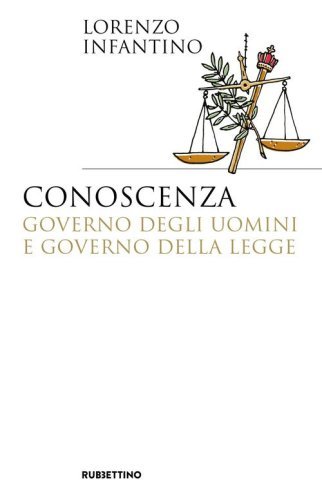There is a very close connection between the theory of knowledge, the theory of social action and the theory of democracy. The three visions are closely interlinked. If we start off on the wrong foot with a theory of knowledge that is full of errors and at odds with the prudent and rigorous method used by science, there are inevitable distortions on what we think about social living, interactions between people, institutions and the very functioning of democracy. And all this has negative consequences for models of social and political organization. There are no "innocent" or "uninfluential" theories of knowledge.
Lorenzo Infantino, professor emeritus at Luiss Guido Carli, has devoted his vast scholarly output to describing these connections, making use of a rare mastery of classical thinkers. He is credited with pulling giants of liberalism, such as Friedrich von Hayek, out of the dust; with making the works of Carl Menger, Ludwig von Mises and the Austrian school of economics more in-depth; and with highlighting the nexus between thinkers such as Montesquieu, Savigny and Burke and the tradition linking Adam Smith, David Hume and Bernard de Mandeville.
In his seminal work "The order without a plan" which came out now 30 years ago and has been translated into several languages, Infantino had already put together all the pieces of a complex mosaic outlining methodological individualism, an approach that contrasts with methodological collectivism. Infantino dismantles all theories that take refuge in the false utopia of an order that is imposed from above, whether it is planning dictated by ideologies such as Marxism or attributing to an absolute and despotic power capabilities that are not of human beings.
In this agile but very dense essay, Infantino makes a sacrosanct demolition of Descartes' philosophy that builds the foundations of idealism on the self-evidence of truth, the rejection of the Socratic method and the claim that there is a privileged source of knowledge. It is from these Cartesian errors that derive the conceptions that entrust men with the power to decide over men while true modernity consists in entrusting laws with the task of regulating social relations by regulating what should not be done and without imposing unacceptable limitations on individual freedom
To Descartes, an admirer like Plato of the myth of Sparta's authoritarianism, and the encyclopedists Infantino contrasts the strand of thought from Montesquieu to Hayek and Popper that is based on the idea that there are no privileged points of view , no decisions that do not have unpredictable consequences, no collective consciousness, a kind of set of ultimate ends that we consciously pursue. Society is not a conscious construction based on a model that is imposed from above or by a group that ascribes to itself "superior" knowledge but is the result of the interaction between individuals who make mistakes and correct their mistakes thus creating a balance ,a social order that is always evolving.
All of these survivals of methodological collectivism continue to form the gnoseological basis of totalitarianism, which claims to dictate to us what to do, in the name of a power that deems itself omniscient and self-validating, that does not admit that it can make mistakes, that sacrifices the individual on the altar of a false idea of society understood as a preordained construction.
Infantino's merit, even with this essay, is to expose all the tricks and traps of illiberal thinking hidden in the works of thinkers hailed as utopians and prophets of a better world, a family album that includes Plato, Descartes, Rousseau, Marx and their epigones.
Lorenzo Infantino: "Knowledge. Government of Men and Government of Laws." Rubbettino Publisher 2024





